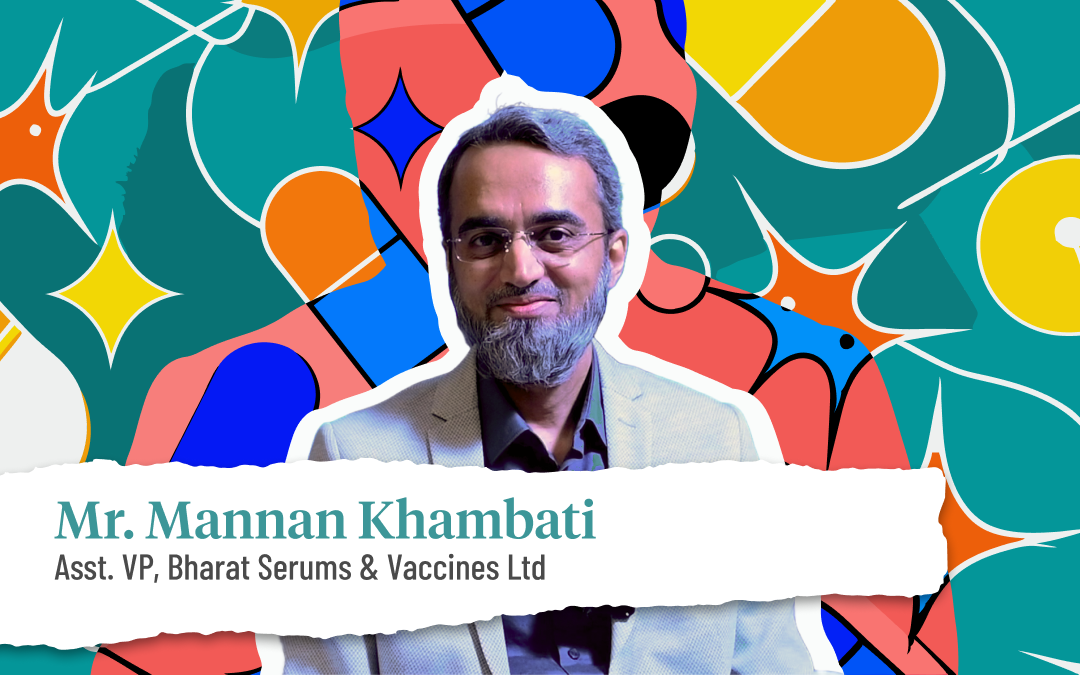QnA
Interview | September 10, 2025
Mukesh Patale is the Head of USP & MSAT (Biologics) at Dr. Reddy’s Laboratories, leading upstream process development for biologics and biosimilars. From humble beginnings in rural Maharashtra to topping his biotechnology class, his journey reflects grit and scientific passion. Starting at the National Chemical Laboratory, he built deep expertise in upstream bioprocessing, highlighting the role of living-cell cultivation in product quality. Mukesh now drives digital transformation in bioprocess R&D, using AI and analytics to accelerate innovation. A mentor at heart, he fosters curiosity, technical ownership, and lives by the belief that “nothing is impossible.”
Pharma Now: Mukesh, welcome to Pharma Now. First of all, thank you for your time. I know your sessions are going on, from a busy schedule, you have come here to share your journey and leadership insights with us. So thank you for that.
I wanted to start this interview because I have seen your two-decade-long journey, particularly in upstream processes. You are one of the experts in the industry with specialization in upstream and MSAT, and you have also spent a decade with Biocon. Coming from a small town in Maharashtra, your journey is truly inspiring. Why don’t you share it from the start? Did you plan this way? Did you always want to get into the biopharma area as a child, or what was your story?
Mr. Mukesh: This was not planned. When I was studying in high school or in the 12th standard, I had not decided that I would go into biotechnology or that I was passionate about research and development. It happened accidentally. At that time, I didn’t have a mentor to guide me about which field was good. People mostly believed that if you went for engineering or medicine, then you were a good student.
Until the 12th standard, I was not a very focused student. I was good at studies, but I lacked motivation and goals. After the 12th, something changed in my mindset. I decided I needed to focus on my studies. My marks in the 12th were not good enough to get into engineering or medical, so the next option was to pursue a science graduation—BSc.
I got admission into Rajarshi Shahu Mahavidyalaya, Latur, which is a very reputed college. That is where my real academic journey started. Until then, even my parents had little hope that I would achieve something, especially compared to my sister and brother, who were both good at studies. Somehow, at Shahu College, my professors motivated me, and I started focusing. My performance improved, and I started topping the class, especially in chemistry. Something triggered that change in me, and I became competitive, scoring high marks in all subjects.
I graduated with microbiology, chemistry, and analytical chemistry as my subjects. When I entered college, my first question to professors was, “Which stream will help me get a job?” because my aim was to secure employment after graduation. That focus made me studious and helped me top the class.
After graduation, my professors encouraged me to go for a master’s degree. I then enrolled in MSc Biotechnology at Nanded University and scored more than 70%. In Maharashtra universities, scoring 70% is very challenging it makes you a university topper. So, I became the university topper in Biotechnology.
I want to highlight that no matter how you start, things can change if there is a trigger. An average student like me becoming a university topper was a surprise for my family and relatives. My father, in particular, was very happy and proud. That remains one of my cherished moments.
So, I completed my MSc, and until then, my entire education was in Maharashtra. I was not exposed to other states. After MSc, the real challenge started. There were no campus placements for biotechnology at that time. Campus recruitment was mostly for engineering students. So, despite being a topper, I had no clear path ahead.
I moved to Pune because there were a few companies there. I literally went door to door, visiting each company and submitting my resume. There was no digital system then—emails existed, but most opportunities came through direct contact. For 3–4 months, I struggled without getting a job. I even approached small biotech incubator centers, ready to work for very low pay, just to gain experience.
Fortunately, I got my first break at NCL (National Chemical Laboratory), one of the top labs. For that, I am grateful to one of my graduation professors from Latur, whose friend was working at NCL. That connection helped me enter NCL.
There was an advertisement for a Project Assistant position on a contract basis (six months to one year). I applied, and by the grace of God, I got the opportunity. My first stipend was ₹5,500. I was so happy to finally start my career.
Getting a first break in biosciences or biopharma, especially in a reputed institute like NCL, is very challenging. I worked there for about one and a half to two years. During that time, I learned the basics of research and developed a research mindset, particularly in microbial process development and upstream. My journey in upstream started with that first job at NCL.
Pharma Now: What excites you more, the upstream process or biosimilar development?
Mr. Mukesh: In upstream, particularly in biopharma, we deal with living cells, and that is the biggest challenge. Handling living cells and maintaining them is like taking care of a baby, how you nourish, monitor, and grow them. The same applies to microbial and mammalian cells. That is what fascinates me: cells have their own journey and growth phases, similar to a microbial growth curve, and they produce the molecule of interest, such as a protein.
In biosimilar development, upstream plays a critical role. Nearly 90% of your final product outcome depends on upstream because the cells themselves produce and modulate the molecule. For monoclonal antibodies, post-translational modifications like glycosylation happen inside the cell. This makes upstream crucial, you don’t get another chance to modify the product later.
In contrast, with generics or synthetic pharmaceuticals, you can rework the product during purification or synthesis. But in biosimilars, the purer your product is in upstream, the less burden you place on downstream, leading to better recoveries. That is why upstream is both the most challenging and the most important area in biologics.
I am passionate about understanding cell growth and improving productivity. Every day brings new challenges, from scaling up processes to ensuring that the manufacturing scale provides the same environment and conditions as small-scale operations. Managing hydrodynamics and environmental parameters at scale is complex, but that challenge itself motivates me to continue working in upstream development.
Pharma Now: You started working in biologics almost 20 years ago, at a time when the field wasn’t as popular as it is today. How was that era, and what was your mindset when you first began?
Mr. Mukesh: There was definitely a boom even back then, with many biosimilar patent expiries on the horizon. Companies like Biocon were ahead of others in this space. Biocon began with small molecules and enzymes, but they saw that the next big opportunity was in biologicals. They started with insulins and then moved to monoclonal antibodies.
I was aware that biologicals were going to be the future. Compared to traditional drugs, biological medicines demonstrated higher efficacy, fewer side effects, and greater impact on improving patients’ lives. Considering the rise of diseases like cancer, autoimmune disorders, and diabetes, the role of biological drugs became even clearer.
My journey at Biocon reflects this progression. I started with enzymes, moved to insulins within six months, and later to monoclonal antibodies. Each step aligned with the industry’s shift towards biologics, and that kept me motivated. By the grace of God and with the right opportunities, I entered biologicals early in my career, and there has been no looking back.
Along the way, I did receive opportunities in vaccines. While vaccines are important, they are an older technology. My mentors advised me that biosimilars were the real future in biopharma, with enormous growth potential. Today, everyone is talking about biosimilars, and by 2030, more than 30 major biosimilar patents are expected to expire. Affordability and accessibility will be the key drivers, and biosimilars will play a major role in making life-saving therapies available to more patients.
Pharma Now: What is the toughest molecule you have worked on in upstream?
Mr. Mukesh: At present, I am working on a fusion protein, which is one of the most challenging molecules. Fusion proteins and monoclonal antibodies are particularly difficult because they involve mammalian cell culture. I have worked in both microbial and mammalian systems, and I can say that mammalian upstream is extremely crucial.
In microbial systems, you are often not producing the final product directly, but rather a precursor that can be modified later. However, in mammalian cell culture, the cells are highly sensitive. Even a small change in the media composition or a trace element can completely alter your growth profile and product quality. This makes the process extremely delicate.
Between monoclonal antibodies and fusion proteins, fusion proteins are even more complex. Developing them requires a deep understanding of all parameters, media, feed strategies, physical parameters, scale-down model qualifications, and the manufacturing environment. Matching biosimilar product quality at the upstream stage is one of the greatest challenges. Maintaining consistent parameters, understanding cell growth, and monitoring metabolism are critical. While challenging, I find this aspect of upstream work truly fascinating.
Pharma Now: In upstream and overall biologics development, what impact has digitalization had? Is it making your work easier?
Mr. Mukesh: Absolutely. Artificial intelligence (AI) and machine learning (ML) are playing a very important role in simplifying our work. They are helping us accelerate research and development by reducing the number of experiments needed. Using statistical and data analysis tools, we can finalize process parameters faster with fewer trials.
For example, in drug discovery and process development, screening has become much faster because of predictive modeling. We feed historical data into the system, and AI generates predictive outcomes. This allows us to know on the third day what is likely to happen by the tenth day. That level of foresight was impossible earlier.
AI is not going to replace scientists. Scientists are essential for interpreting and analyzing what AI produces. However, those who fail to adopt AI tools will eventually be replaced by those who do. That’s the reality. Today, process analytical technology (PAT) tools, AI, and ML models are integral to our daily work.
If I compare this to 15 years ago, the difference is significant. Earlier, finalizing a process in R&D would take much longer. Today, because of QbD approaches and advanced equipment like parallel bioreactors, we can accelerate work tremendously. Instead of running one 1L or 10L bioreactor at a time, we now have systems with 15 mL to 250 mL parallel bioreactors running 24 at once. This has revolutionized how we conduct experiments. Innovation and digitalization have made scientific work faster, more efficient, and less error-prone.
Pharma Now: What has been your approach to adopting AI and new technology tools?
Mr. Mukesh: Fortunately, the companies I have worked with were always progressive and encouraged the adoption of new technologies. Whenever a new tool came in, whether it was statistical data analysis, AI, or machine learning, we were trained and motivated to learn and apply it.
I also took personal initiative. For example, when I realized the importance of statistical data analysis, I enrolled in a statistics course at ISI, traveling almost 40–50 kilometers every Saturday to attend. Later, I also completed Lean Six Sigma Green Belt training to further improve my skills.
This continuous learning mindset is essential. If you want to grow in your career and contribute meaningfully to your company, you must adopt and adapt to new technologies. Staying stagnant or outdated is not an option in biopharma.
Pharma Now: In this journey of leadership, you must have mentored hundreds of researchers and juniors, guiding them through upstream processes and different phases of development. Can you share one experience where you felt especially proud of a student or mentee, someone who inspired or surprised you?
Mr. Mukesh: Yes, there have been many such instances. At Biocon, for example, we used to host a large number of interns every year, many from IITs and other reputed institutes. They would typically work with us for six to seven months. I always told my interns and juniors: be curious, do more than what is required, and never restrict yourself only to the tasks assigned. I encouraged them to look beyond their immediate work, for instance, if they were doing upstream experiments, I wanted them to also understand how the same batch was performing in downstream.
My approach has always been to identify and nurture their strengths. Rather than focusing too much on weaknesses, I believe in recognizing what they are naturally good at, whether it is curiosity, hands-on skills, or going beyond expectations, and helping them build on that. For example, I once advised a few bright interns not to rush into jobs immediately after their B.Tech.
I encouraged them to pursue a Master’s degree, explaining that while short-term employment might seem attractive, higher studies would open many more doors and accelerate their careers in the long run. Some of them followed that advice, and today, I see them excelling. One of my former students, for instance, went to the U.S. for his Master’s, gained several years of experience there, and is now heading a manufacturing site in India, currently holding an even higher position than me. That makes me very proud.
I have also mentored some colleagues who I felt were better suited for management rather than research. I guided them accordingly, and one of my direct reportees, after years of experience, eventually pursued an MBA in the U.S. I was even one of the referees for his application. Seeing people I’ve mentored grow in their own unique directions is very fulfilling.
Beyond technical skills, I emphasize the importance of interpersonal skills. In the industry, how people perceive you matters a lot. Communication and the energy you bring into interactions are crucial. I always tell my mentees: be positive, avoid constant complaining, and focus on learning something good from everyone around you. Those who focus only on negatives will always find more negatives.
Even today, I remain in touch with many of my former interns, students, and colleagues. Some reach out to me for career guidance, and I try to help them in whatever way I can. I have also been invited to universities and colleges for talks, where I continue meeting young talent. For me, mentoring is an ongoing journey.
Pharma Now: Finally, I would like to understand your perspective, what are the upcoming trends in biopharma?
Mr. Mukesh: Currently, biosimilars are at the center of discussion because many patents are expiring. Every major pharma company is moving towards biopharma. However, beyond biosimilars, the next big shift is in cell and gene therapy, which is moving the industry from affordability-driven medicines to precision medicines.
Gene therapy, including CRISPR-based approaches, enables patient-specific treatment, what we call personalized treatment. At present, these therapies are very expensive and not affordable to everyone. But the movement has started. For example, even at Dr. Reddy’s, we have a dedicated cell and gene therapy unit under the biologics division, located in Bangalore.
So the trend is evolving: from generics that focused on affordability, to biologics that provide higher efficacy with fewer side effects, and now towards precision treatment, patient-specific and targeted.
Another major development is bispecifics, where a single drug has two indications or combines two functional groups, such as an antibody and a fusion protein. This is an exciting innovation but will take time to become mainstream, just as it took time to transition from generics to biosimilars.
In India, widespread adoption of gene therapy will take time, as affordability remains a barrier. Initially, such treatments will be accessible only to higher-income groups. But globally, momentum is strong. For the near future, biosimilars will continue to dominate, with multiple waves of patent expiries creating enormous opportunities.
It has taken nearly 15–20 years to build this momentum, but now biologicals and biotechnology-based companies are clearly the future focus. Earlier, pharma profits were driven by generics, but today, with intense competition and pricing pressure in generics, the industry’s attention has decisively shifted.
India is no longer just a participant but is becoming one of the top global players in biosimilars. While generics have always been India’s strength, biosimilars are now positioning the country as a key supplier in developed markets as well. Very soon, India will be recognized worldwide as a leading provider of biosimilars.
Pharma Now: All right, Mukesh, I think it’s time for a quick rapid round. Ready?
Mr. Mukesh: Yeah, sure.
Pharma Now: The first thing you notice in a young scientist?
Mr. Mukesh: The energy.
Pharma Now: One leadership value you never compromise on?
Mr. Mukesh: Enthusiasm and curiosity to learn new things.
Pharma Now: What do you prefer in a team member, speed or accuracy?
Mr. Mukesh: A combination of both. Accuracy is very important, but in the industry, speed is equally necessary. So I prefer efficiency, which means accuracy with speed.
Pharma Now: If a process fails at 3 a.m., who should call you—junior or lead?
Mr. Mukesh: Juniors, definitely. At 3 a.m., juniors will be on the floor, so I expect the call from them. I try to solve their problem. This has happened many times in the past, especially in upstream. We work 24/7. I’ve received calls at midnight, early morning, or 3 a.m. Being in upstream, MSAT, manufacturing, or R&D, our phone has to be on 24/7, no matter if it’s Saturday, Sunday, holiday, or vacation.
Pharma Now: One thing you tell your team when they hit a bottleneck?
Mr. Mukesh: Try to see solutions. I understand there’s a problem, but look at different opportunities. I tell people to understand the root cause, use tools like a fishbone diagram, identify sources of the problem, and then solve it. No need to panic, stay calm, no worries, we will solve the problem.
Pharma Now: The most underrated leadership trait, listening, resilience, vulnerability, or feedback?
Mr. Mukesh: Feedback. It’s very important. Sometimes leaders hesitate to give critical feedback, but without it, the team won’t improve. Even if it feels uncomfortable, leaders must provide feedback to help their teams grow.
Pharma Now: A book or a principle that shaped how you lead?
Mr. Mukesh: A principle. I wasn’t a great student, I studied only academic books, but I watched many motivational videos. Discipline, dedication, and focus are very important to grow in your career. I wasn’t focused until my 12th, but then my mindset changed, and today I’m here. Even my relatives can’t believe I’m in this position. If you follow principles in life, you will grow.
Pharma Now: What’s harder, scaling a molecule or scaling a team?
Mr. Mukesh: Both are challenging, but scaling a molecule is much harder. Even with fewer team members, we can stretch ourselves and manage. But scaling a molecule from lab to manufacturing to serve patients, that’s the real challenge.
Pharma Now: One piece of advice you’d give young bioprocess leaders?
Mr. Mukesh: Upskill yourself. Always be ready to learn new technologies and adopt them quickly. Be observant—whether in R&D or MSAT, you must notice everything. Don’t just follow SOPs blindly; observe what’s happening around you. Observation is critical.
Pharma Now: The final question: If your legacy was one statement, what do you hope it says?
Mr. Mukesh: Nothing is impossible. Anything can happen if you decide. Work on yourself, learn, and improve every day. Be the best version of yourself daily. Don’t depend on others’ validation, believe in yourself. Keep learning, keep upgrading your skills. The learning journey is continuous.
Pharma Now: Mukesh, thanks a lot for sharing your insights. This was truly an insightful conversation, and I’m sure your stories will inspire the upcoming generation to learn and grow in this process.
Mr. Mukesh: Thanks a lot.

FT - Dr. Subhash Thuluva

FT - Ms. Rajni Jha

FT - Mr. Mannan Khambati

FT - Dr. Pratima Srivastava

FT - Dr. Subhash Thuluva
Dr. Subhash Thuluva, Senior VP at Biological E, shares his 25-year journey in clinical development, ...

FT - Ms. Rajni Jha
Ms. Rajni Jha, a seasoned pharmaceutical specialist, shares her journey from the lab to becoming a l...

FT - Mr. Mannan Khambati
Mr. Mannan Khambati, AVP of Biotech Manufacturing at Bharat Serums and Vaccines, shares his inspirin...

FT - Dr. Pratima Srivastava
Dr. Pratima Srivastava, Vice President at Aragen, shares her remarkable journey from aspiring scient...